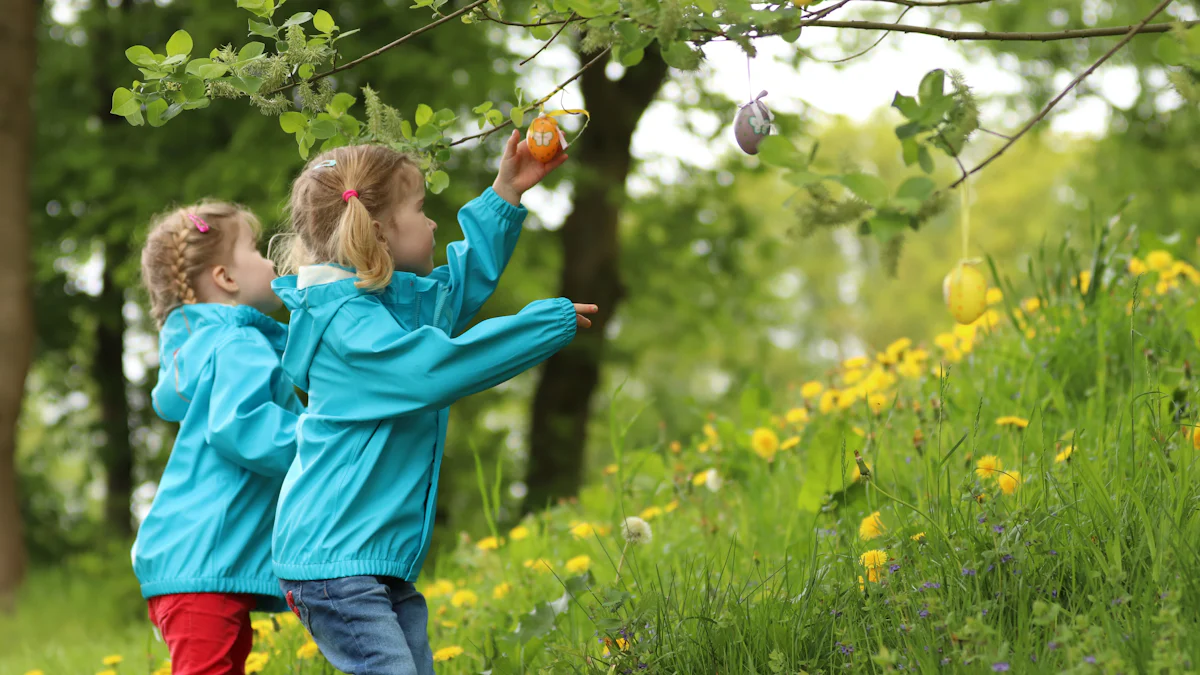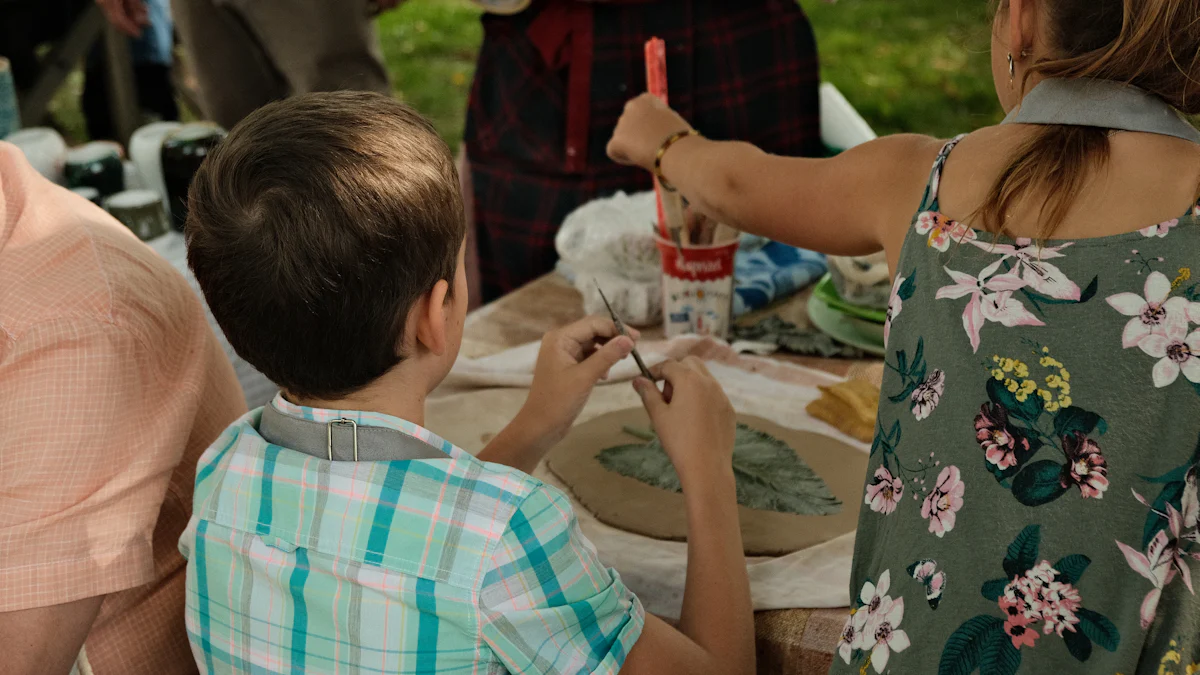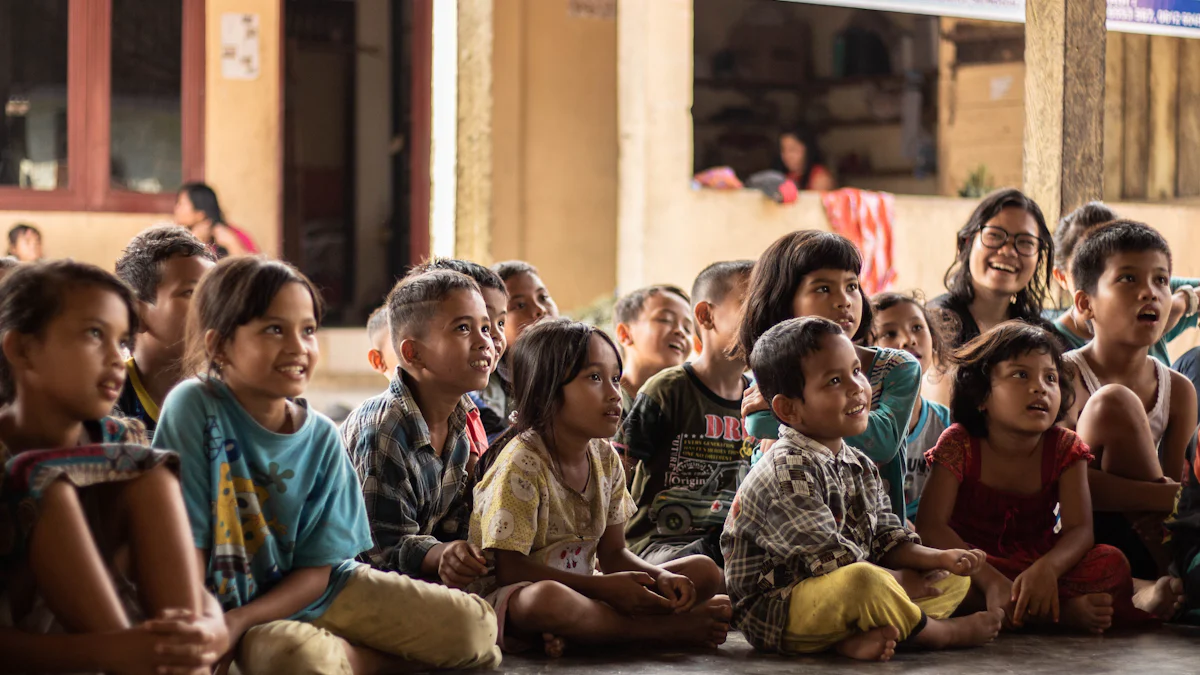How to Raise Kids Who Are Empathetic and Considerate

Empathy and consideration shape a child's world. These qualities unlock doors to understanding and compassion. Children who embrace empathy connect deeply with others. This connection nurtures personal growth and enriches social interactions. Parents share stories of success when children practice empathetic responses. These stories highlight the transformative power of empathy. Raising kids with these traits creates a ripple effect. The impact extends beyond the family, touching communities and society. Every act of kindness contributes to a brighter future. Parents play a vital role in this journey. The mission is to raise kids who lead with their hearts.
Belief in the Child's Capacity for Kindness
Understanding Innate Empathy
Children possess an innate ability to empathize. This natural empathy often appears early in life. Parents can recognize these early signs through simple observations. For example, a child may comfort a crying friend or share toys willingly. These actions indicate an emerging sense of empathy. Parents can nurture this trait by acknowledging and praising such behaviors.
Curiosity plays a vital role in developing empathy. Children naturally ask questions about others' feelings and experiences. Encouraging this curiosity helps deepen their understanding of empathy. Parents can engage in conversations that explore emotions and perspectives. Stories and books that highlight diverse experiences also serve as valuable tools. These activities help raise kids who are empathetic and considerate.
Fostering a Positive Environment
A positive environment greatly influences a child's capacity for kindness. Creating a safe space allows children to express themselves freely. Parents can establish this environment by being approachable and non-judgmental. Open communication fosters trust and encourages children to share their thoughts.
Promoting open communication involves active listening. Parents should pay attention to their child's words and emotions. This practice validates the child's feelings and encourages further dialogue. Parents can also model effective communication by expressing their own emotions openly. These efforts contribute to raising kids who understand and respect others' feelings.
Parent Success Story: Many parents have shared their success stories in implementing empathetic responses. These stories highlight the transformative power of empathy in parenting. Parents have observed positive changes in their children's behavior and interactions. The Bridges2Understanding journal features numerous accounts of these experiences.
Raising kids who are empathetic and considerate requires belief in their capacity for kindness. Parents play a crucial role in nurturing this potential. By understanding innate empathy and fostering a positive environment, parents can guide their children on this journey. The impact of these efforts extends beyond the family, creating a ripple effect in society.
Modeling Positive Behavior

Leading by Example
Parents shape their children's behavior through daily actions. Demonstrating empathy in everyday life teaches kids valuable lessons. Show kindness to others. Offer help when someone needs it. These actions leave a lasting impression on children.
Consideration in interactions also plays a crucial role. Speak kindly and listen attentively. Respectful communication fosters understanding. Children learn to mirror these behaviors. Parents who practice consideration raise kids who value others' feelings.
Expert Testimony: Cynthia, an expert in parenting education, emphasizes the importance of working with children rather than controlling them. This approach builds a positive relationship and encourages empathy.
Reflecting on Personal Actions
Self-awareness in parenting leads to better outcomes. Reflect on personal actions and their impact on children. Recognize moments when empathy might be lacking. Make conscious efforts to improve. This reflection helps parents raise kids who understand empathy.
Consistency in behavior is essential. Children notice when actions align with words. Maintain a consistent approach to kindness and empathy. This consistency reinforces positive values. Kids learn to trust and emulate these behaviors.
Parent Success Story: Cynthia shared how she and her daughter developed strategies to manage frustrations. This collaboration strengthened their bond and taught valuable emotional skills.
Parents who model positive behavior raise kids who are empathetic and considerate. Leading by example and reflecting on actions create a nurturing environment. These efforts contribute to a future filled with kindness and understanding.
Treating the Child with Respect
Valuing the Child's Opinions
Respect forms the foundation of any strong relationship. Parents can raise kids who feel valued by actively listening to their opinions. Listening actively involves giving full attention to the child's words. Eye contact and nodding show engagement. Acknowledging the child's feelings fosters a sense of importance. Kids learn that their thoughts matter.
Encouraging expression allows children to share ideas freely. Parents can create an environment where kids feel safe to speak up. Open-ended questions invite deeper conversations. Kids develop confidence when parents validate their expressions. This practice strengthens the parent-child bond. Children grow into empathetic individuals through this nurturing approach.
Interview Insight: A father shared the importance of listening to his daughter's emotions first. This practice improved their connection significantly.
Establishing Mutual Respect
Mutual respect between parents and children builds trust. Setting boundaries with empathy ensures that kids understand limits without feeling restricted. Clear explanations help children grasp the reasons behind rules. Parents can involve kids in discussions about boundaries. This involvement encourages cooperation and understanding.
Teaching respectful communication equips kids with essential social skills. Parents can model polite language and considerate behavior. Role-playing scenarios help kids practice these skills in a fun way. Kids learn to express themselves respectfully and listen to others. This foundation prepares them for positive interactions in various settings.
Interview Insight: Parents experienced greater harmony by working as a team. A unified approach to raising kids improved their relationship as a couple.
Parents who treat their children with respect raise kids who value others. Valuing opinions and establishing mutual respect create a nurturing environment. These practices contribute to raising empathetic and considerate individuals. The journey of parenting becomes more rewarding through mutual understanding and respect.
Coaching on Emotional Recognition
Identifying Emotions
Teaching Emotional Vocabulary
Parents can empower children by teaching emotional vocabulary. Words help children express feelings clearly. Use books and stories to introduce emotions. Discuss characters' feelings and actions. Encourage children to describe their own emotions. This practice builds emotional intelligence. Children learn to articulate complex feelings.
Recognizing Emotions in Others
Recognizing emotions in others fosters empathy. Encourage children to observe facial expressions. Ask questions about how others might feel. Use role-playing games to practice this skill. Children develop a deeper understanding of empathy. Parents can share success stories of using empathetic responses. These stories inspire children to connect emotionally with peers.
Managing Emotions
Techniques for Emotional Regulation
Teach children techniques for emotional regulation. Breathing exercises calm the mind. Counting to ten helps manage anger. Encourage physical activities to release energy. Parents can model these techniques during stressful moments. Children learn to handle emotions constructively. Emotional regulation leads to healthier interactions.
Encouraging Empathetic Responses
Encourage children to respond empathetically. Praise acts of kindness and consideration. Highlight positive outcomes from empathetic actions. Share stories of successful parenting strategies. These stories demonstrate the power of empathy. Children feel motivated to practice empathy in daily life. Empathetic responses create a compassionate environment.
Engaging in Community Service

Participating in Family Volunteering
Family volunteering creates opportunities for growth and connection. Choose age-appropriate activities that match your child's interests. Animal shelters, community gardens, or local food banks offer engaging options. These experiences teach valuable lessons about empathy and teamwork.
Reflecting on experiences enhances understanding. Discuss the impact of your actions with your child. Ask questions about feelings and observations. Encourage your child to share thoughts on helping others. This reflection deepens the learning process and strengthens family bonds.
Case Study: Val and David shared how mutual support in mentoring enriched their experience. Family volunteering offers similar benefits. Working together fosters a sense of fulfillment and unity.
Encouraging Acts of Kindness
Simple daily acts of kindness nurture empathy. Encourage your child to perform small gestures like holding doors or sharing toys. These actions build a habit of consideration. Praise these efforts to reinforce positive behavior.
Celebrating kindness motivates continued empathetic actions. Create a kindness chart to track daily acts. Recognize achievements with small rewards or family celebrations. Highlighting kindness inspires your child to lead with compassion.
Case Study: Parents Work Together as a Winning Team learned effective strategies through collaboration. Family volunteering and daily acts of kindness provide similar opportunities for growth.
Raise kids who understand the value of empathy through community service. Engage in family volunteering and encourage acts of kindness. These practices create a foundation for a compassionate future.
Empathy and consideration in children foster a compassionate world. Implement key strategies to nurture these traits. Believe in the child's capacity for kindness. Model positive behavior. Treat the child with respect. Coach on emotional recognition. Engage in community service. Parents who embrace these practices witness transformative changes. Children develop deeper connections and understanding. A father shared how acknowledging his daughter's emotions improved their bond. Parents investing in parenting programs see positive responses from kids. Raising empathetic children shapes a brighter future. Every act of kindness contributes to a more caring society.
See Also
Guiding Children to Develop Empathy in a Competitive Society
Nurturing Emotional Wellness in Children through Self-Care
Instilling Respectful Behavior in Your Children
Creating a Sense of Value and Worth in Children
Fostering Emotional Intelligence in Children in the Digital Age

